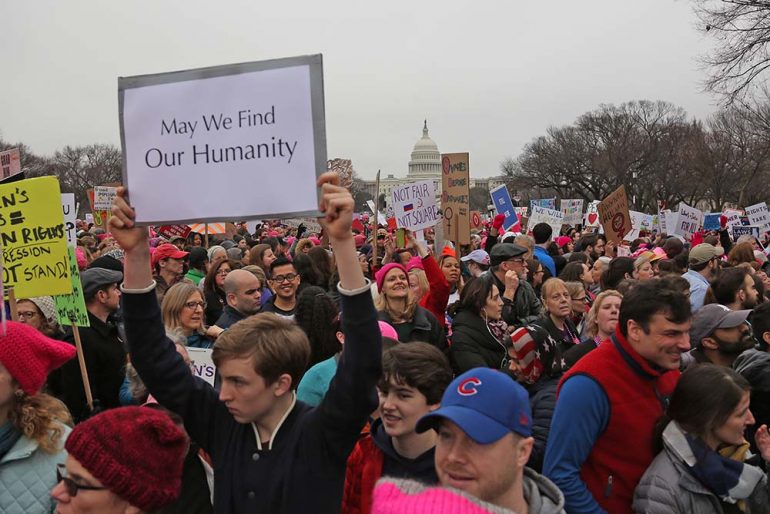WASHINGTON — When Stephen Klatsky first heard of the Women’s March on Washington, he wondered if men would be invited or if they would be considered an interference with the purpose of the event.
Klatsky, a Washington resident, wrote a letter to the editor of The Washington Post, after reading several articles stating men were reluctant to join the march.
“For too long, men have been a part of the problem. I want to be part of the solution,” the retired lawyer wrote in the letter.
Alongside his wife, Klatsky took to the streets of the nation’s capital to march for their three daughters and five granddaughters.
“I’m marching to focus attention on that women can decide what they will be in their life, it’s not a decision for men to decide,” he said.
Klatsky recalled when he was at Albany Law School in 1972, only four women were in his 128-person class. Additionally, as a military police officer in the U.S. Army, he was there when women were first integrated into that branch of the service.
“There were initial fears that women wouldn’t be able to protect the male officers – all ended up being hogwash….,” Klatsky said. “Being able to witness that was profound.”
Men did march in numbers today in support of wives, sisters, daughters and family members with posters, “pussy hats,” pins, t-shirts and more. Additionally, a MENofWM organization was created to rally men to come and march.
Patrick Nolan came from Upper Marlboro, Maryland, wearing a pink knit hat and Hillary Clinton campaign pins.
“How could you not come down here if you’re a thinking person who values science, human rights and decency?” Nolan said.
Nolan does not think that Trump will change his ways now that he is in office because he already “had his chance – he had 13 (chances) when he selected his cabinet.”
“I think it was Maya Angelou who said, ‘When someone shows you who they are, believe them,’” Nolan said.
Joe Breakey came from Ann Arbor, Michigan, to march for his 15-year-old daughter, who is at home with his husband.
“I’m concerned about as she grows up and her rights are taken away as a woman, that’s really disturbing to me,” Breakey said.
Breakey, wearing a blue t-shirt, with the world “ I RESIST,” came to march because he resists the new administration, feeling that Trump is not afraid to bully people.
“I feel like that bullying is now being put forth as something that is okay and that’s not okay with me,” Breakey said.
Jolearra Tshietya, a project photographer for the James Webb Space Telescope, feels “indifferent” about men coming out in support for women at the march.
“I feel men should alawys be beside us,” Tshietya said. “They should always be ready and willing to support women at any time.”
Tshietya herself came to march to support her friends , the sisterhood and to bond with women.
Adrian Kianne from Capitol Hill sat next to his wife, Jo Brooks, with a sign at his feet that read: “This is what a feminist looks like.”
“He has cared about women’s rights all his life,” Brooks said.
Kianne came to support the march and all its causes – equality, friendship, “and all things we’re afraid we might be missing.”
“All the things that are going under the table and out of sight, we want to make sure that they stay on the top of the table and that everyone can see them,” Kianne said.

